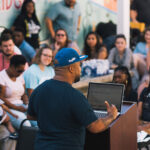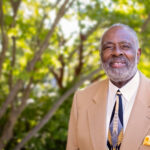A few years ago, as Crossway staff were considering whether to invest in new ESV Bible recordings, they spoke with an expert in the audio publishing industry.
“You may not want to get into audio Bible production,” the expert told Crossway chief publishing officer Don Jones. “Audio Bibles are really complicated and time consuming.”
He was right—they are.
“An audio Bible involves around 70 to 75 hours of listening time,” Jones said. But recording one—including catching and rereading errors—takes around 200 to 250 hours. Editing and proof-listening requires another 800 hours. In all, producing an audio Bible takes around 1,000 hours of labor.
At the end of 2023, Crossway released six of them, read by Conrad Mbewe, Kristyn Getty, Ray Ortlund, Jackie Hill Perry, Robert Smith Jr., and Michael Reeves.
“This was the most exacting, precise, detailed, and demanding task I’ve performed since my doctoral work 40 years ago,” Ortlund said. “It was also immensely satisfying.”
Smith said the same thing: “It was the most challenging ministerial assignment I’ve had in almost 58 years—and also the most rewarding.”
The Gospel Coalition asked the six narrators how they managed to pronounce all those names in Numbers, which books were their favorite (and least favorite) to record, and how reading the Bible aloud affected them.
Narrator: Jackie Hill Perry
Occupation: Speaker, author, spoken word poet, hip-hop artist
Age: 34 years old
Accent: American
Length of project: Two years
Reading the Bible aloud “kinda changed my life,” Jackie Hill Perry said. “That sounds dramatic, but it did.”
She’d always wanted to read the whole Bible, so Crossway’s ask seemed like a dream come true. “At the same time, I knew it would be a commitment, because the Bible is big.”
She started reading at home during the pandemic. Right away, she ran into trouble.
“I was pregnant, so I couldn’t breathe as well,” she said. “I had to keep stopping to gather my breath.”

The second problem was her house. “I realized it isn’t the best place for me to do disciplined work,” she said.
So she moved to a nearby studio, planning to record for five to six hours a day. But that didn’t work either.
“My voice couldn’t take it,” she said. “I’d record, pause, vaporize. I’d be hoarse.”
So she slowed down. She tracked the word count on her phone, figuring out she could manage 10,000 to 12,000 a day. Then she planned accordingly: She could do Matthew in one sitting. Jeremiah would take two days. Jude would take an hour.
Perry reads quickly—sometimes she had to slow down to pace herself. Still, the whole project ended up taking almost two years.
“I had writing projects, school, and a baby in between all of it,” she said. “Crossway was extremely patient with me.”
Her favorite books were 1 and 2 Samuel and 1 and 2 Kings. “Those stories gave me so much perspective for Israel’s history, in a way I didn’t have before.”
She made her way through Hebrew names and places by pulling up David Cochran Heath’s earlier audio version of the ESV. “I’d play it, pause it, say it,” she said.
She didn’t mind the difficulty—“I think it helps you to realize the Bible involves real people,” she said. “We so often skim past the names and we miss they’re real human beings God decided to write about.”
She preferred the lists to the book of Matthew.
“I don’t like parables,” she said. “And when you’re reading, it has this rhythm that feels redundant.” (In Matt. 25:14–28, “talent” is written 17 times. In Matt. 13, “seed” shows up 10 times, in addition to the similar-sounding “weed.”)
As Perry recorded, studio engineers would follow along to make sure she didn’t miss any words.
“None of them were Christians,” she said. “I would pray before every session, ‘Lord, use this to draw them to yourself.’ One engineer was with me throughout the whole Old Testament. I would ask, ‘What did you think about Habakkuk? Or Amos?’ He was like, ‘Man, it’s crazy. The more you read, I realize it feels like people just don’t know how to get it right.’”
“Exactly,” she told him. “That’s why we need Jesus.”
That wasn’t the only fruit she saw.
“Now when I am doing podcasts or interviews, I can pull Scripture out of my pocket quicker,” she said. “I had a really hard situation recently, and the amount of Scripture I have in me kept me stable. Two years ago, I don’t think I would have had as much stability in a trial like this.”
She was recently in a conversation with a friend about how life feels chaotic. “I was thinking that Scripture begins with God putting order to chaos,” she said. “And then God organizes the chaos when Israel was in Egypt. I have a frame of reference, multiple texts that relate to the Lord’s ability to make things right.”
She pauses a moment, considering her experiences. “That thing is alive.”
Narrator: Conrad Mbewe
Occupation: Pastor in Zambia, author, speaker, TGC Africa Council member
Age: 62 years old
Accent: Zambian
Length of project: 18 months
When Crossway staff asked Conrad Mbewe to read the Bible aloud, he was surprised.
“I didn’t expect that I would ever be asked to do anything like this,” he said. “I embraced it with both hands—I think partly because I thought it wasn’t going to take as long as it ended up taking.”
At first, he figured all he needed was a quiet space, so he headed to a local Christian radio station with his laptop and a request—could he record the Bible in one of the rooms they weren’t using?
“The assistant manager just started laughing,” he said. “She said to me, ‘Pastor, we have done this kind of project before, and it is not that simple.’”
He ended up using a studio there, with a pastoral intern reading silently along. When he misread anything, the intern signaled by knocking on the table.
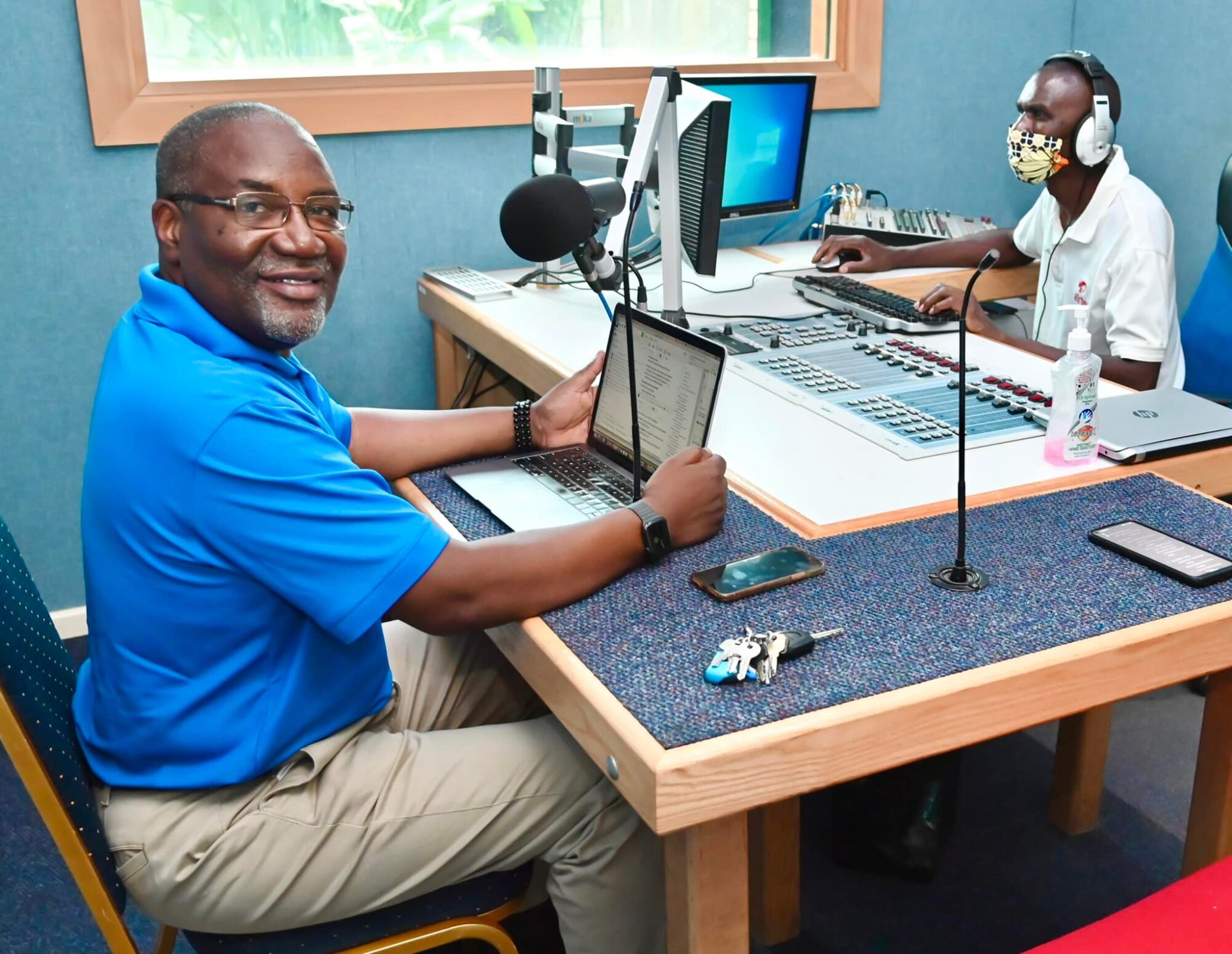
“Then I would repeat that sentence, which happened quite a few times,” Mbewe said with a laugh. “The human mind sometimes reads what it thinks is there.”
After each chapter, a radio station producer would clean up the audio. Then Mbewe would listen to it again, usually picking up one or two remaining mistakes. Once he was finally happy with it, he’d send it to Crossway and get to work on the next one.
The most difficult parts were the long lists of names, he said. The most enjoyable were the histories of the kings of Israel or Judah, one after another.
“It gave me a sense of flow, a sense of why God finally got fed up and put judgment on them,” he said. “I was able to see that quite easily in a sitting or two.”
Because Mbewe’s style of teaching is what he calls “microscopic,” concentrating only on a verse or two at a time, he loved the panoramic view that came from reading all of Scripture in a limited time.
He also loved the emotional experience. “It went beyond head knowledge,” he said. “It was more like you were warming your heart before a fire.”
That’s exactly what Crossway was hoping would come across.
“We wanted to find readers who had a genuine living relationship with the Lord and were full of his Spirit,” Jones said. “There is a life, a power, an authenticity that comes through when a Christian is reading the words of their God.”
Narrator: Kristyn Getty
Occupation: Hymn writer and singer
Age: 43 years old
Accent: Northern Irish
Length of project: A year
When the Gettys publicly perform their hymns, Kristyn loves to read Scripture aloud. So she was thrilled when Crossway asked her to read the entire Bible.
“Although I did wonder how I would juggle the children and the touring and this,” she said, laughing.
Turns out, she didn’t have to. COVID-19 shut down all public performances, and the Gettys relocated from their Nashville home to Northern Ireland. Kristyn read mostly at night, after the kids were in bed.

“I absolutely loved it,” she said. She’d start each session by reading a prayer she’d taped to her microphone: Lord, give me clarity and fluency. Please let this impact my own heart, and please use it as you will.
Kristyn read the Psalms first. “It was like the first song in a concert—I was fresh,” she said. Because it’s poetry, she was also able to read with a little more emotion. For the rest, she tried to read as neutrally as possible.
“I’ve studied the Bible my whole life,” she said, “but I haven’t done intensive academic study on every verse to determine—Was Jesus’s voice raised there? Was he making a joke? Was he a little bit angry?”
She took advice from her brother, a film and television director. “Just use a normal speaking voice,” he told her.
That felt hardest when speaking the Lord’s words, Kristyn said. “One of the most challenging parts was reading the direct words of God in the Old Testament and Christ in the New Testament. I found myself treading even more carefully, eager to speak them plainly and not get in the way.”
Her favorite book—and the one that affected her most—was Isaiah.
“I had not realized how much Isaiah is a foundational book for the understanding of biblical picture language,” she said. “There was something about reading Isaiah that unlocked my understanding of the Bible. It made me want to study that book more deeply—to dig into it as a songwriter.”
We may hear all kinds of Scripture-inspired offerings from Getty Music in the future.
“There are some beautifully written parts of the Bible, and when spoken out loud you get a greater sense of how they might sound being sung,” Kristyn said. “Sometimes I’d read a verse and make a note of it in my journal or songwriting notes—Oh, that passage needs to be a hymn.”
Narrator: Ray Ortlund
Occupation: President of Renewal Ministries, pastor, author, TGC Emeritus Council member
Age: 74 years old
Accent: American
Length of project: Most of a year
Fifty years ago, Ray Ortlund was sitting in a seminary class in the basement of the Dallas Theological Seminary library when he had an epiphany.
“Lewis Johnson was teaching basic New Testament exegesis,” he said. “Suddenly God gave me two clear and distinct realizations. One, this is what I was born to do. Two, for the rest of my days, I’m going to be a serious student of the Bible.”
So when Crossway staff asked Ortlund to be a narrator, he couldn’t say yes fast enough.
“It could not have been more appropriate, meaningful, purposeful, or satisfying,” he said. “This is a sacred privilege I don’t deserve. And my grandchildren will be able to hear me reading the Bible after I’m gone. There’s no way I was going to turn that down.”
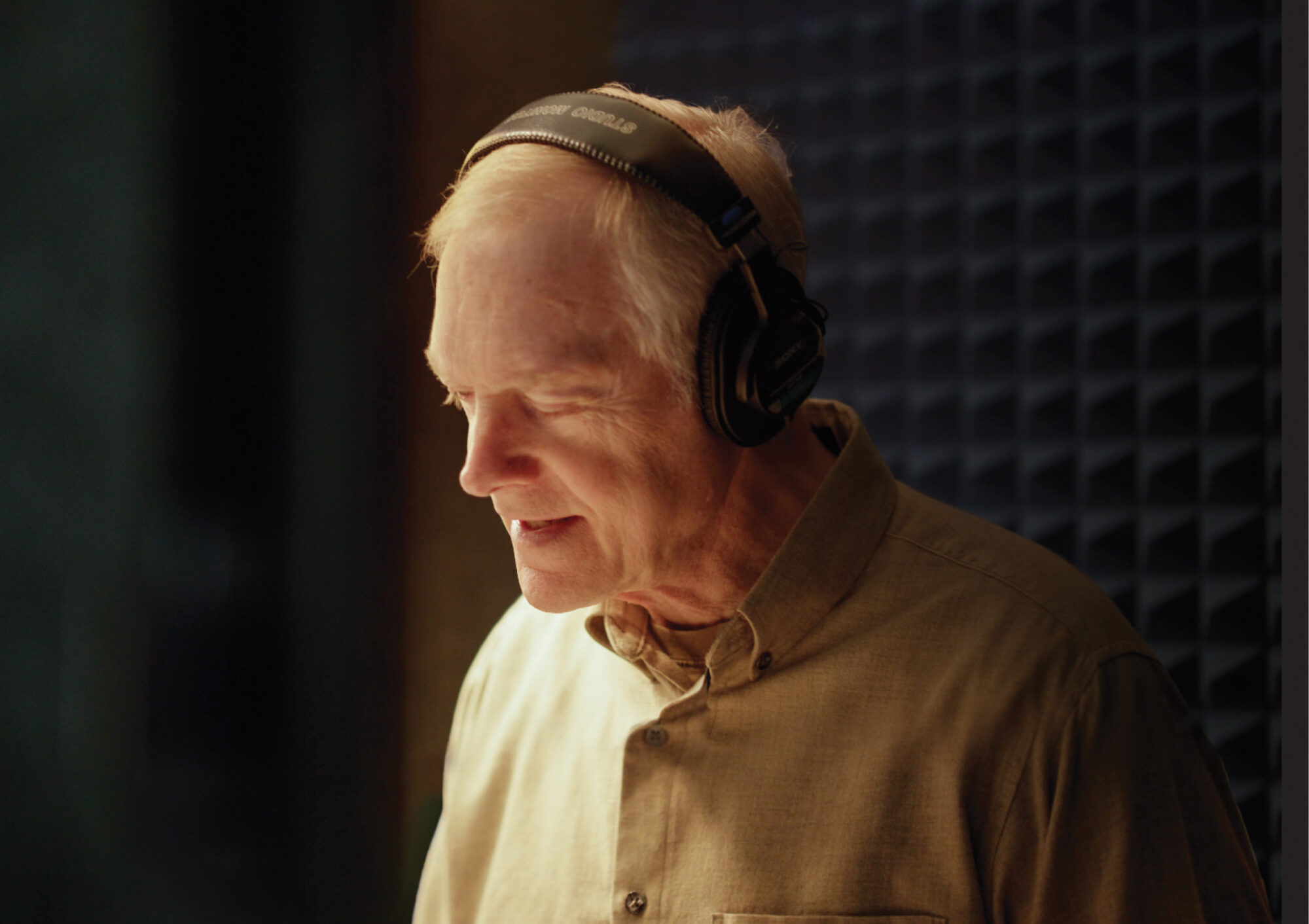
Crossway arranged a small “whisper room” in his spare bedroom, constructed with fiberboard and foam to absorb sound.
“It was great—I just had to walk in and press a button and talk,” he said.
Unfortunately, talking was the tricky part.
“There are about 750,000 words in the ESV,” he said. “I suddenly, embarrassingly, discovered what a sloppy reader of the Bible I was. Without realizing it or intending to, I was leapfrogging over little bits along the way.”
He was also too optimistic about how fast he could go. “I thought it would take a few months, but it took most of a year,” he said.
Ortlund read on his iPad, except when he got to the genealogies. For those, he pulled out the big guns.
“I have a pulpit Bible—a huge ESV,” he said. “I wrote diacritical marks over each name so I’d know which syllable to emphasize.” To figure it out, he used the Harper Collins Bible pronunciation guide. The little green paperback was his best friend but also his worst enemy.
“I often disagreed with it,” Ortlund said. “For example, for hundreds of years, people in the English-speaking world have been pronouncing the word Shechem ‘sheck-um.’” But the proper Hebrew pronunciation is ‘sh’kem.’”
When they fought, the guide almost always won.

“Nine times out of 10, I’d cave,” Ortlund said. “I’d swallow my pride and pronounce this beautiful Hebrew word in a technically incorrect way, because I didn’t want my reading to become a distraction. For people whose ears are accustomed to ‘sheck-um,’ I don’t want them to wonder why I said it a different way and lose track of the message of the Bible.”
He read straight through, from Genesis to Revelation. “When I got through Ezekiel and Daniel, the minor prophets are such a joy and go quickly. And the New Testament was pure pleasure.”
His favorite books to read were Psalms, Isaiah, John, and Romans.
“Of the biblical Himalayas, those are the high peaks,” he said. “I think of Isaiah as air traffic control for the Old Testament. The lines of thought and aspiration and understanding run through it. Romans does the same thing for the New Testament.”
Since that day in seminary, Ortlund has never stopped seriously studying the Bible. He’s read through it many times. But this time was different.
“The cultural and historic foreignness of the Bible landed on me with fresh clarity and impact,” he said. “Being careful, word by word and syllable by syllable, made me more attentive and sensitive to what was actually there. I came out of myself and my world and my mind and more into the Bible itself. It was a journey into a distant land—it was Tolkienian in that sense.”
Narrator: Robert Smith Jr.
Occupation: Preaching professor at Beeson Divinity School, author, speaker
Age: 74 years old
Accent: American
Length of project: Six weeks
“I’ve never had an opportunity to do anything like this before,” Smith said. “In terms of impact, this is an opportunity to participate in disseminating the Word of God throughout the world.”
Since Smith carries a full travel and speaking schedule in addition to his seminary employment, his only window to record was in the summer. Six days a week, for six weeks, he got to his quiet office around 3:30 in the morning and worked until the evening.
He read from xeroxed copies of the Bible with extra-large font so he could hold it up instead of having to look down. The administrative staff made his copies and brought him meals.
“I always had coffee or tea,” he said. “And I had people who were praying for me.”
The hardest part was 1 Chronicles. “It doesn’t give you a break,” he said. “The list of names goes for nine chapters.”
First, he tried to pronounce them on his own. Then he looked in pronunciation books and listened to other recordings. Some he had to say over and over until he got them.
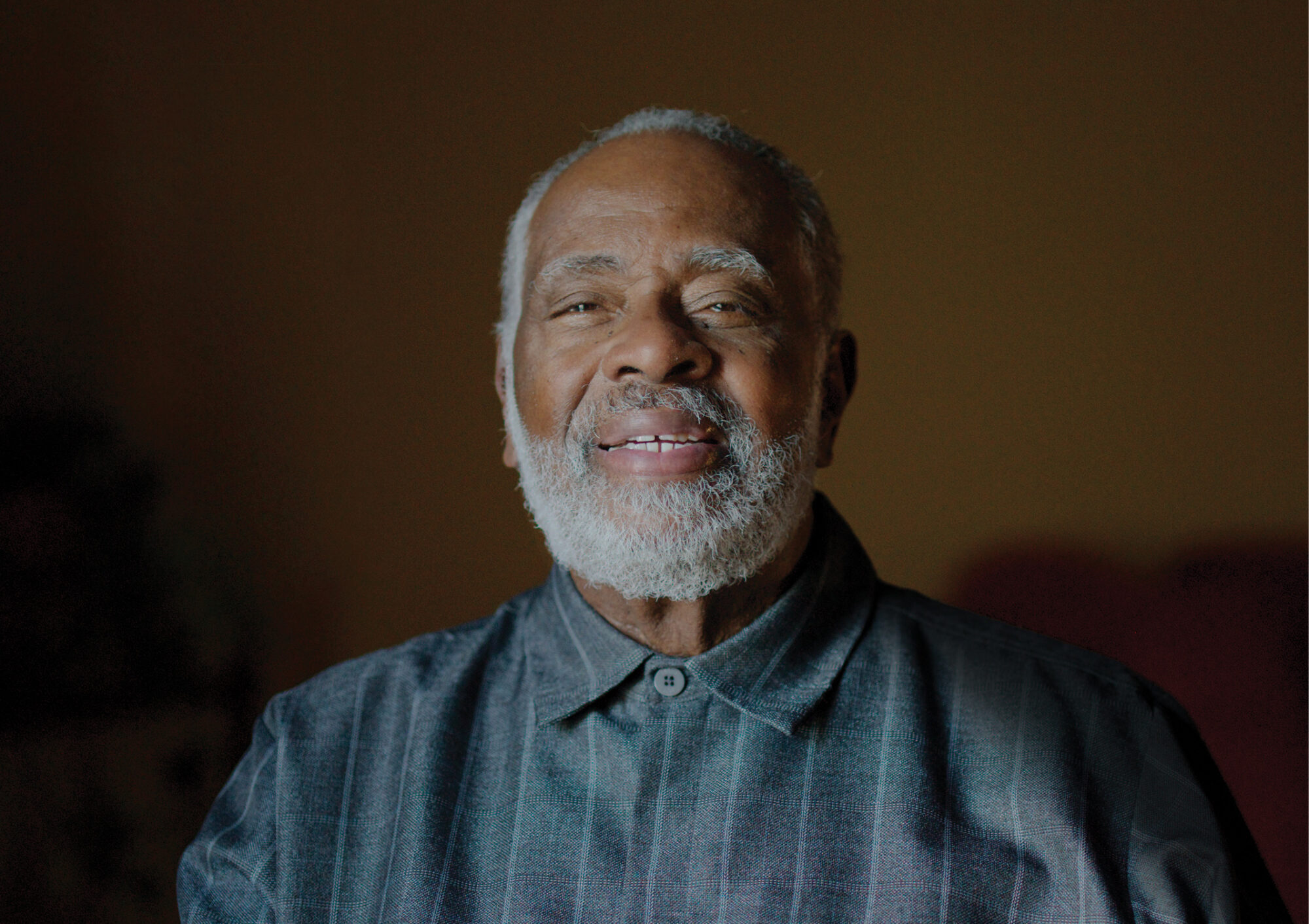
“After a while I had to take a break,” he said, chuckling. “I love the Bible, but some parts are more interesting than others. I did not have a shouting spell when I read those names, believe me.”
He did love reading Joshua—it’s his favorite book of the Bible.
“I’ve had a chance as a preacher to walk through it,” said Smith, whose commentary Christ-Centered Exposition: Exalting Jesus in Joshua was released last April. “Christ is in there, you know, so vividly and so clearly.”
After a full day of reading, he’d head home to prepare for the next day. “First of all, I had to pray,” he said. “Then I needed to go over the stories, over the Gospels and the narratives, to see the emotional output and connection that was being made.”
The preparation was “the slow part,” he said. He wanted not only his voice but his face to express the emotions of the passage accurately. And while some books—such as Genesis—he’s familiar with from 28 years of preaching, some—such as Ezekiel—took a little extra studying.
In all, Smith spent about 18 hours a day thinking about, reading, and rereading the Bible.
“I even dreamed about reading specific verses of Scripture,” he said. He knew that familiarity could be dangerous—just as dangerous as it is to people who sit in church every Sunday and open their Bibles every morning.
“I tell people the greatest obstacle to the knowledge of the Bible is the knowledge of the Bible,” Smith said. “What keeps us from knowing more about the Bible is that we think we already know it.”
He asked God to help him become like a child who had never heard the words before.
God gave that to him, he said. “It was life transformative.”
(Read more about Smith’s experience.)
Narrator: Michael Reeves
Occupation: President and theology professor at Union School of Theology in the U.K.
Age: 49 years old
Accent: British
Length of project: A year
A few weeks before Crossway approached Michael Reeves, he was listening to Heath’s audio version of the ESV as he exercised.
“I was really enjoying it, but because he’s American, sometimes I had to do a bit of translation work,” Reeves said. “I thought about sending an email to Crossway to say, ‘Is there any chance you would ever do a British one?’”
Before he could inquire, he got the ask from Crossway. He was delighted—“Yes. Definitely. I didn’t even have to think about it.”
Reeves read alone in his small home study. Sometimes he read at night, sometimes in the morning. Some days he’d read 10 chapters; some days he’d only do one.

He didn’t often study the passages ahead of time, but he did think about how the context would affect his tone.
“I know of one Bible narration where the Lord in the Old Testament sounds like the Emperor from Star Wars, while New Testament Jesus has a lovely, gentle voice,” he said. “And I thought, That’s actually quite theologically important. You’re saying something significant with your tone, whether you meant to or not.”
Reeves wanted to make sure all the Lord’s words were rooted in love—even those meting out hard discipline. He read them from a screen so the mic wouldn’t pick up the sound of pages turning. That decision only gave him trouble once.
“I opened up the wrong Bible translation,” he said, laughing. “I recorded a few chapters before I realized it was the NIV.”
He started with Ruth, mainly so he could avoid Genesis.
“I was particularly terrified of Genesis and John,” he said. “The first chapters are so iconic, so well known. . . . John is rammed with meaning, and the Pentateuch is the foundation for the whole Old Testament, so it feels like the pressure is heightened.”
Still, Genesis was one of his favorite books to read, along with Revelation and Psalms. “To be reading out such glorious, heavenly doxologies!” he said. “I didn’t want to move because the mic would pick up the sound, but I couldn’t hold it in. My arms were going all over the place.”
He half wondered if Crossway would send those parts back to be read more sedately. They didn’t.
Before each reading, Reeves would pray for his heart, for clarity of mind and speech, and for those who would eventually hear it. He’s already been able to see fruit.
“Over the last month, I’ve seen a lot of younger people in my church pick this up,” he said. “They’re on their screens more, and so less prone to open up their Bible for very long. They are really enjoying having audio.”
They’re also listening to longer sections of the Bible, he said. “If they open up their print Bible, they’ll read a few verses. But this way, they’ll listen to maybe a couple of chapters. I’ve had conversations with youngsters in my church who are suddenly seeing how books of the Bible fit together better because for the first time, they’re listening in big chunks.”
He’s also seeing fruit in his own life.
“When you read the Bible in different ways, it can shift what you get out of it—different things pop out,” he said. So having a variety of voices is almost like having multiple translations of the ESV. Reeves has been listening to passages from each of the other authors and comparing their emphasis and inflection.
“I’m finding that absolutely fascinating,” he said. “This entire project was an absolute delight. I want to do it again.”
Crossway probably won’t ask Reeves to read again. But that doesn’t mean they’re done. Spoken word artists Trip Lee and Thomas Terry are already working on future releases. And Jones is starting to look for more international voices, such as Indian, Asian, and Australian.
“We recognize the Lord is saving people from every tribe, people, and language,” Jones said. “It is a joy to reflect that diversity in the voices we record.”
Is there enough evidence for us to believe the Gospels?
 In an age of faith deconstruction and skepticism about the Bible’s authority, it’s common to hear claims that the Gospels are unreliable propaganda. And if the Gospels are shown to be historically unreliable, the whole foundation of Christianity begins to crumble.
In an age of faith deconstruction and skepticism about the Bible’s authority, it’s common to hear claims that the Gospels are unreliable propaganda. And if the Gospels are shown to be historically unreliable, the whole foundation of Christianity begins to crumble.














